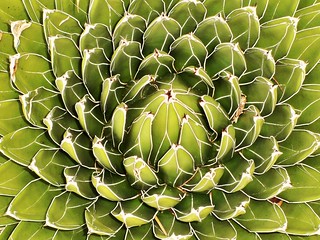

photo courtesy of kevinlubin
Years ago, philosopher of science Michael Polanyi described science as a republic, one that depended on scientists all contributing their expertise to a common purpose, independent but also interdependent. As you explore the primary literature about plants, you'll be getting a glimpse of how this republic works and will have a chance to enter into its conversations. This guide will link you to some entry points.
"The Republic of Science shows us an association of independent initiatives, combined towards an indeterminate achievement. It is disciplined and motivated by serving a traditional authority, but this authority is dynamic; its continued existence depends on its constant self-renewal through the originality of its followers. The Republic of Science is a Society of Explorers."
References in the chemistry literature form a network of ideas. They are important ways to map a scientific conversation over time.
Going backward in time:
When you have an article with references, you can see if a particular reference is available by looking the journal's name up in our
You can see who has cited an article (or an author) using the form below or clicking on "Do we have this journal?" on the library's main page. Then you can use the volume and date information to navigate to the article. If we don't have access to that journal, we can get it from another library.
Going forward in time:
If you have a good article in front of you, see who has cited it by searching in either SciFinder or Google Scholar. That will let you click on newer publications that cite it (and Google Scholar will also run the same search in Web of Science for you). Then use find it! button to get the article or request it from another library.
When you have a source with a bibliography, you can see if a particular article from the bibliography is available by looking the journal's name up at the link below. Then you can use the volume and date information to navigate to the article. If we don't have access to that journal, we usually can get it from another library.
These databases can help you locate primary articles that may be valuable in your research. They index publications but don't always lead to full text. Remember, we will be able to get the articles you need within a day or two using interlibrary loan.
Libraries are linked together through an interlibrary-loan (or ILL) system. Libraries share books and make digitized articles available to people throughout the state connected through this system. What you need to know:
If you have a reference to an article you want, you don't need to go through a database to order it. There's a form you can fill in with the citation information, but it's cleverly hidden. To find it ...
From this page, you will also have the option to download PDFs of articles you have requested recently. Be sure to download them because they will vanish after a period of time.
Zotero is a free program for saving citations, taking notes, and formatting reference lists. Once you download Zotero and install a browser connector, you can use it to save webpages, articles in databases, and book references from the library catalog, library databases, Amazon, or Google Books. Your collected references can be synced from one computer to another and can be accessed online through any web browser. Sort your references into project folders, tag them, add annotations and, when you want to create a reference, simply drag them into a document and choose a format. See the Zotero Quick Start Guide to get started, try our very brief general guide to Zotero, or see Jason Puckett's guide for more tips and strategies.
A note for Zotero users - you can set up Zotero to recognize content in our databases by clicking on Edit > preferences > Advanced, and adding under Resolver this URL: http://worldcatlibraries.org/registry/gateway
Zotero works with Google Docs. An optional plug-in for Word (or Open Office) is also available. Open Zotero and install the plugin found under Tools - Options - Cite. The plugins will then be found in Word under the Add-Ins tab (PC) or under the scripts menu (Mac).
Want more information? Contact a reference librarian.
NOTE: Though Zotero originally was developed as a Firefox plugin, it now must be downloaded as a standalone program with a Firefox connector installed as an add-on.
Plant Physiology 1979-2009 in print; current years online
Plant Cell 1989 - 2009 in print; current years online
American Journal of Botany 1925-2010 in print; current years online
Science 1891-present in print
Nature 1957-present in print
BioScience 1964-present online
Ecology 1920 to present online
Journal of Ecology 1913-present online
Canadian Journal of Botany 1985-2007; changed title to Botany 2008 - present in print
This work is licensed under CC BY-NC-SA 4.0